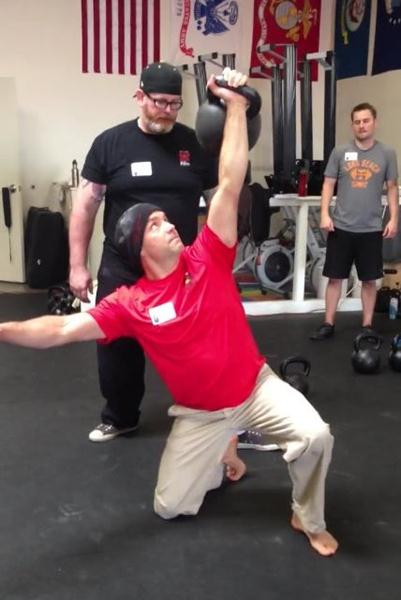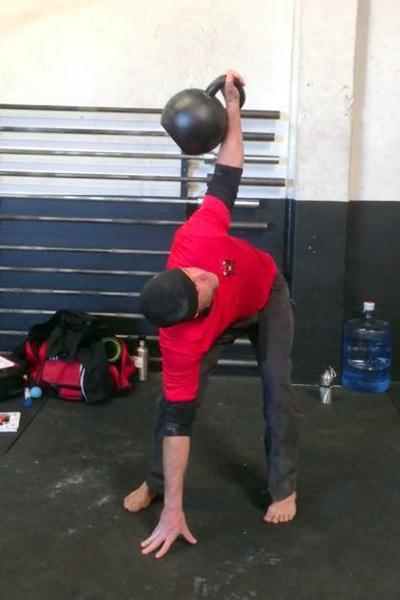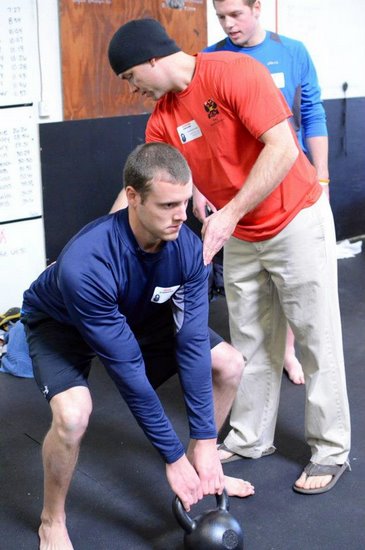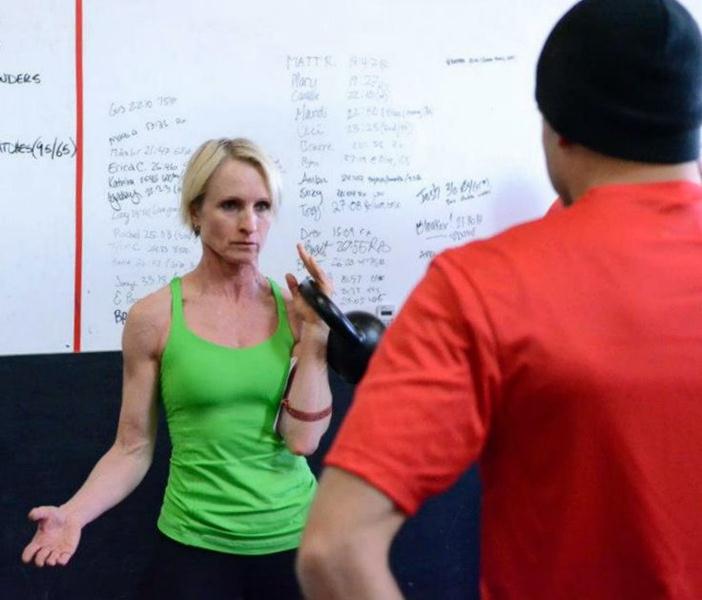Dragon Door Interviews RKC Team Leader Aaron Pierson
by Adrienne Harvey PCC Team Leader, RKC-II, CK-FMS, Primal Move Nat’l Instructor

Dragon Door: How did you get started with fitness and strength?
Aaron Pierson: I grew up as a high school runner and enjoyed the whole track and field experience. At the time, was one of the top high school recruits. I ran a little bit in college before things went south—I had a little time gap in my life where I wasn't into anything, but once I got your life back in order, I went back to my first love which is basically fitness and training.
Dragon Door: How did you get involved with kettlebells?
Aaron Pierson: I found them at a local martial arts gym where I was training Krav Maga. At the time, a Senior RKC came to teach a martial arts workshop—and chose to show us a few kettlebell drills which caught my eye. It was impressive watching him train, and I was looking for something new and different from the typical "globo-gym" training I was doing.
Kettlebells also seemed to match the style of my martial arts. I fell in love with kettlebells.
Dragon Door: Considering the way we needed to schedule your interview today, it seems like you have a very intense schedule.
Aaron Pierson: Yes, I work 48 hours at a time—48 hours on the ambulance, and 96 hours off is my regular schedule. During my time off, I’m either at home or at the gym running classes or training personal clients. On the days I am on the ambulance I have three other
instructors who can teach for me at the gym.
Dragon Door: How do kettlebells fit into your lifestyle?
Aaron Pierson: They fit very well. While I love the barbell and heavy weight, kettlebells are just so convenient. If I don’t want to go to the gym, I have a kettlebell at my house that I can use—or if the weather is nice, I can train outside. It’s really great working for EMS—because kettlebells are so portable, I can work out at the gyms in our stations. No matter which station I’m at, I can rely on the kettlebell I always have with me. We have fitness centers in all the EMS stations, but they are not always the same. So no matter where I am, I can always have a kettlebell training as available option. Kettlebells work well for recovery and strength. I switch back and forth between heavy barbell work and kettlebells—I might run 6 weeks of heavy barbells then a month or two of just nothing but kettlebells. They really make the body heal—it’s great recovery and gets me off the heavy loads.

Dragon Door: Are there any particular benefits from kettlebell training that’s helped with your EMS job?
Aaron Pierson: I think so, especially for strengthening the back. I’m 38 and have been in the EMS field for ten years and into kettlebells for about five years. I don't have the back issues that many of the EMS guys have. Maybe I’m lucky, or maybe I can credit it to the kettlebell training. It’s not just the strength side of it either, learning correct movement patterns has carried over to my job. The squat and
deadlift movement patterns really apply to picking up a patient.
Dragon Door: What other results have you noticed with kettlebell training?
Aaron Pierson: Kettlebells have put some size on me! I'm not a big person but growing up as a runner, I was tiny. I weighed 155lbs at the time of my
HKC, and by the time I went to an
RKC Workshop I weighed 165lbs without much change in my body fat percentage. Kettlebells have allowed me to put on healthy weight. The combination of barbell and kettlebell training has also increased my fitness level considerably. I love to run and grew up running, but sometimes it can be very time consuming. What I found when I was sparring a lot was that I was able to maintain my fitness level by training with kettlebells at the same level as when I was running intervals. With kettlebells, I was able to keep up with my sparring partners without having to do the heavy conditioning training that they are doing.
Dragon Door: What inspired your career in EMS?
Aaron Pierson: I was looking for something new when I took a class, but halfway through it I thought it was very interesting and something that I might want to do as a career. I looked into it deeper, and by the time the class was completed, I was ready to jump in. It’s a gratifying job in many of ways, but can be very destructive in other ways. It’s been very healthy for me to get into
fitness training because EMS—and people who have been around that field for a long time know—can change a person, and not always for the better. The fitness world brings out the best in people and has brought balance to my life.
In EMS, we spend a lot of time around very sick unhealthy individuals. Not all of them are the nicest people and it takes a toll. But being around and working with clients has helped me more than I'm helping them because of the change in perspective. It’s helped me realize that there are also a lot of good people out there too. Working in EMS, we are very reactive—someone calls, and we go. In the fitness world, we’re more proactive and that's something that drove me to train others. When I work with people in the ambulance, I can’t help but wonder if when I train clients to be stronger and healthier I won’t have to see them on the ambulance.

Dragon Door: What are some of the best drills for firefighters and EMS?
Aaron Pierson: I love the kettlebell deadlift because we spend a lot of time in that position picking up patients, moving patients and following that movement pattern. Learning to do it correctly can be a back-saver. The get up is another favorite, and just a good all-around skill. Simple drills like kettlebell swings and carries are also very helpful. We don't need to make our training complicated—it’s more about being able to function If you’re working out in the morning and get a call, you can't be so exhausted that you can't do your job. Kettlebell training can be something simple to help keep our backs healthy. Carries—racked carries, overhead carries—can help someone get used to carrying a firehose up and down the stairs. Conditioning training could simply be kettlebell swings and running up and down the stairs. Something like that can help a firefighter get used to working under stress and under the gear to do their job without being short of breath right away.
Dragon Door: What type of clients do you usually train?
Aaron Pierson: I do a lot of group and private training with men and women. Many people who train with us don't want a traditional gym workout. We offer multiple programs starting with very basic level programs designed to teach the movement patterns and skills they’ll need before progressing past the first four weeks. Our
programs are very progressive, but can be repeated with good results until someone has met our requirements to move to the next phase. We want everyone to learn how to train in a safe manner.

I recently led a workshop at a CrossFit gym in Indiana. I met the gym owner a few months ago, and he wanted to learn more about kettlebells for his gym. So we worked with his clients and trainers and brought them up to speed with the basics. Now, he wants to either host an HKC at his facility, and/or become RKC certified. I want the RKC to get more exposure like this—now they know what we do and how their coaches can learn more and get certified.
Dragon Door: What can you bring to your new leadership position as an RKC Team Leader?
Aaron Pierson: I’d like to bring even more exposure and openmindedness. I think some of the old ways of thinking in the RKC were very closed minded. There’s no single right way to do things, and we need to find what fits the individual, and the safest possible ways of training.
When I was up in Denver for the RKC, we were working with 10-12 firefighters at that workshop. It was encouraging to see their group which was from more than one fire department. They really put themselves out there and wanted to learn how to use kettlebells to benefit their people.
My job on the ambulance allows me to live with the fire department, so I’ve had a chance to work with a handful of firefighters and they’ve been able to apply it to their programs. Training with kettlebells safely and effectively has worked out really well for them.
Dragon Door: Why did you choose to accept a leadership position with Dragon Door?
Aaron Pierson: Dragon Door’s professionalism is huge and made a big difference for me. I was extremely impressed with how fast I’ve gotten responses from Dennis and the staff—even though I know they are super busy. John Du Cane always seems to respond to me within 2-4 hours which I think is amazing. I also have a lot of respect for guys like
Andrew Read, and was really impressed after meeting
Keira Newton and
Mark Bixby. When I was working with them I wanted to see what direction the RKC was going, and I liked what I saw, especially their professionalism. Even from the outside looking in, it’s obvious that Dragon Door isn’t just stuck on one subject anymore. I like that they’re bringing
Marty Gallagher and Brad Gillingham in to teach barbell work—that’s huge. It’s going to be great to attend their workshop.
The old RKC was very "kettlebell only" and while I love kettlebells, I’m not comfortable saying it’s the best form of training for everyone. I think it is a very useful tool that can be built into any program, but there’s no reason to give others a hard time for running or using dumbbells too. Not everyone should run all the time, but everyone should be able to easily run a mile or two. Personally, I don't like snatching but we have to do it sometimes to be well rounded. I like my clients to also be as well rounded as possible. I think running is very natural, and that the body was designed to run, walk, and squat. The movement patterns of running, walking, squatting, and hinging are all very natural—kids do these movements all the time. I think we were too closed-minded and I’m looking forward to more changes.
Back